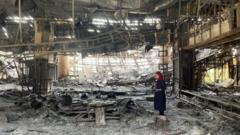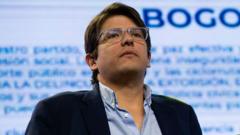As Pope Francis, 88, recuperates from pneumonia in a Roman hospital, questions concerning his end-of-life decisions have surfaced, underscoring an urgent need for clarity in the Catholic Church's protocols.
Pope Francis Faces Urgent Questions on End-of-Life Decisions Amid Health Crisis

Pope Francis Faces Urgent Questions on End-of-Life Decisions Amid Health Crisis
Pope Francis' recent hospitalization prompts discussions regarding his health choices, with the Vatican remaining tight-lipped on his end-of-life plans.
In a troubling twist of fate, Pope Francis has been hospitalized for pneumonia, raising critical concerns about his health and future decision-making. The 88-year-old pontiff experienced a respiratory crisis during a two-week stay at Gemelli Hospital, prompting urgent discussions within the Church about his potential incapacity and end-of-life wishes.
While the Vatican assures that the Pope’s condition is "stable," and he has shown signs of improvement, uncertainty looms about Francis’ personal directives. He has previously mentioned a resignation letter filed with the Vatican for emergencies; however, the contents remain confidential. Furthermore, the existence of a living will or appointed health decision-maker is also unknown.
In facing these pressing topics, the Vatican refrained from commenting publicly on the Pope’s preferences, labeling such discussions as premature. Yet, experts in Church matters argue that lacking a standardized procedure for end-of-life decisions for the Pope presents a significant concern. This situation transcends theoretical debates; it raises a pragmatic question of governance should the leader of the Roman Catholic Church become noticeably incapacitated.
Despite supporters appreciating the Pope's resilience, the critical condition he faced on Friday has intensified dialogue on how the Church should approach end-of-life scenarios involving its highest official. Without definitive protocols, the future remains uncertain in a time of need.
While the Vatican assures that the Pope’s condition is "stable," and he has shown signs of improvement, uncertainty looms about Francis’ personal directives. He has previously mentioned a resignation letter filed with the Vatican for emergencies; however, the contents remain confidential. Furthermore, the existence of a living will or appointed health decision-maker is also unknown.
In facing these pressing topics, the Vatican refrained from commenting publicly on the Pope’s preferences, labeling such discussions as premature. Yet, experts in Church matters argue that lacking a standardized procedure for end-of-life decisions for the Pope presents a significant concern. This situation transcends theoretical debates; it raises a pragmatic question of governance should the leader of the Roman Catholic Church become noticeably incapacitated.
Despite supporters appreciating the Pope's resilience, the critical condition he faced on Friday has intensified dialogue on how the Church should approach end-of-life scenarios involving its highest official. Without definitive protocols, the future remains uncertain in a time of need.




















